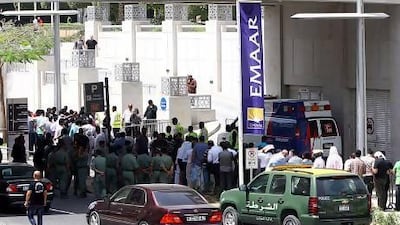DUBAI // Seven new laws in the next two years will regulate Dubai’s property market and ward off speculators.
The laws are aimed at maintaining the recovery in property values without a price bubble, protecting investors, increasing the flow of development finance and curbing the practice of rapid “flipping” of off-plan purchases.
Dubai’s property market has entered a new phase of growth and increased demand, said Sultan Butti bin Mejren, director general of the Dubai Land Department.
The new laws will sustain that growth and protect the market from harmful practices, he told Al Ittihad, the Arabic-language sister newspaper of The National.
Experts yesterday welcomed the planned legislation. “I endorse any changes in the laws that are there to protect the investor or the end user,” said Mario Volpi, managing director of Prestige Real Estate in Dubai.
“Dubai needs to retain its position as a world-class city and if better legislation comes into force for the real estate market this is going to be good news for all,” he said.
“I’m especially happy about the new laws that will help to curtail the flipping of new off-plan sales, which absolutely will help make Dubai a more mature real estate market,” Mr Volpi said.
Mr Bin Mejren confirmed that developers were entitled to attach conditions to sales contracts to prevent speculation and maintain price levels.
Some developers define a time period of six months to a year within which a property may not be resold, which limits the role of speculators.
The department is working on establishing binding controls to regulate the re-sale of property, he said, include thresholds for premiums, and the percentage of completion of a project before homes can be sold.
Mr bin Mejren described the emirate’s property market as dynamic, with more than 60 per cent of units leased.
The total value of property transactions increased by 30 per cent in the first half of this year to Dh108 billion, compared with Dh83 billion for the same period last year. He expected the recovery to continue, but ruled out a property bubble with a steady rise in sale and rental prices.
Increases were logical and expected after the drop in prices during the global financial crisis, he said.
The land department is also working on legislation for the Tayseer programme, which encourages property development finance in cooperation with banks, and the Tanmia initiative, which aims to restructure stalled projects so that construction work can be resumed.
Tayseer programme was launched in free zones during the financial crisis when banks were reluctant to offer credit to developers.
To benefit, property companies must be registered with the department and have at least 60 per cent of a project complete.
More than 300 property investors have done so, Mr bin Mejren said.
“It is hard to know what will be the scope of the new legislation, but I assume it will have a consumer protection ‘flavour’ based more on the further regulation of activities by and through existing ‘watchdog’ regulatory bodies than the granting of further enforceable personal legal rights for buyers and investors,” said David Nunn, partner at Berwin Leighton Paisner’s Dubai office.
“Of those measures that have been trialled, I would welcome further controls setting thresholds for premiums to be paid, and the required percentage of completion of a project, as these should mean developers taking greater development finance risk and for longer periods, which ought logically to lead to greater discipline in the process of evaluating and bringing forward new projects, with opportunities for speculation therefore being reduced.”
Joe Durkin, a partner at Davidson & Co, said: “Given the rise of property prices generally in Dubai in the past 12 months, it would seem inevitable that there will be an increase in the demand and supply of newly built properties.
Indeed there has already been a marked increase in the number of new developments being launched. It is therefore now ripe to consider what new levels of protection can be put in place for investors coming into the market.
“The prospect of further off-plan developments being launched often leads to a marked rise in speculation, as speculators can take a highly leveraged position in paying a small initial deposit or first instalment in an attempt to sell their interest on, capturing a market rise in the underlying value of the contract, prior to paying the next instalment. It is this widespread practice which it appears that regulations are proposed to address.
“Some of the larger developers have sought to restrict such practices by, for example, incorporating terms disallowing the transfer of an interest in the property until nearer half of the overall purchase price of the off-plan property has been paid to the developer. Other jurisdictions often impose certain capital requirements to be committed by developers in selling off-plan properties. Transparent and robust regulations would certainly minimise the risk of future projects being cancelled.”
* Additional reporting by Lucy Barnard

